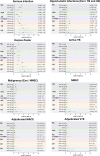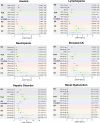Safety Profile of Upadacitinib: Descriptive Analysis in Over 27,000 Patient-Years Across Rheumatoid Arthritis, Psoriatic Arthritis, Axial Spondyloarthritis, Atopic Dermatitis, and Inflammatory Bowel Disease
- PMID: 40875187
- PMCID: PMC12474609
- DOI: 10.1007/s12325-025-03328-y
Safety Profile of Upadacitinib: Descriptive Analysis in Over 27,000 Patient-Years Across Rheumatoid Arthritis, Psoriatic Arthritis, Axial Spondyloarthritis, Atopic Dermatitis, and Inflammatory Bowel Disease
Abstract
Introduction: We report the long-term safety of upadacitinib (oral, selective, and reversible Janus kinase inhibitor) in rheumatoid arthritis (RA), psoriatic arthritis (PsA), ankylosing spondylitis (AS), non-radiographic axial spondyloarthritis (nr-axSpA), atopic dermatitis (AD), Crohn's disease (CD), and ulcerative colitis (UC).
Methods: Data were analyzed from 16 studies (data cutoff August 15, 2024). Each treatment group was pooled across studies within each indication. Active comparator arms included adalimumab (RA/PsA) and methotrexate (RA). Treatment-emergent adverse events (TEAEs) were reported as exposure-adjusted incidence rates per 100 patient-years (n/100 PY).
Results: This analysis included 8632 (RA, n = 3209; PsA, n = 907; AS, n = 596; nr-axSpA, n = 286; AD, n = 2683; CD, n = 450; UC, n = 501) upadacitinib-treated patients over 27,164.2 patient-years (range 199.4-12,315.8 PY across indications). Rates (n/100 PY) of any TEAEs ranged from 112.0 (AS) to 401.1 (RA). Most frequently reported TEAEs included COVID-19, upper respiratory tract infection, nasopharyngitis, herpes zoster, urinary tract infection, and acne (primarily patients with AD). Serious TEAEs ranged from 4.5 (AD) to 11.0 (UC), and those leading to discontinuation ranged from 2.9 (AS) to 8.3 (UC). TEAEs leading to death ranged from 0 (nr-axSpA, UC) to 0.7 (RA). Among upadacitinib-treated patients across indications, rates of adverse events of special interest ranged from 1.3 to 4.6 (serious infection), 2.4-6.6 (herpes zoster), 0.2-0.9 (malignancy excluding nonmelanoma skin cancer [NMSC]), 0-1.4 (NMSC), 0-0.5 (major adverse cardiovascular event [MACE]), 0-0.9 (venous thromboembolism [VTE]), and 0-9.2 (elevated creatine kinase). In RA and PsA, herpes zoster, NMSC, and elevated creatine kinase rates were numerically higher with upadacitinib vs active comparators. Serious infection, herpes zoster, malignancy (excluding NMSC), NMSC, MACE, and VTE rates remained stable over time.
Conclusion: This descriptive analysis indicates a long-term safety profile of upadacitinib consistent with previous reports, further supporting long-term treatment of chronic diseases with upadacitinib. Variations in TEAE rates across indications likely reflected differences in populations and underlying comorbidities.
Trial registration: ClinicalTrials.gov identifiers NCT02675426, NCT02706951, NCT02706847, NCT02629159, NCT02706873, NCT03086343, NCT03104374, NCT03104400, NCT03178487, NCT04169373, NCT03569293, NCT03568318, NCT03607422, NCT03345823, NCT02819635.
Keywords: Arthritis; Atopic dermatitis; Axial spondyloarthritis; Infections; Inflammatory bowel diseases; Major adverse cardiovascular events; Malignancy; Rheumatoid; Safety; Upadacitinib.
© 2025. The Author(s).
Conflict of interest statement
Declarations. Medical Writing/Editorial Assistance: Medical writing support was provided by Jay Parekh, PharmD, ISMPP CMPP™, of JB Ashtin, and funded by AbbVie. Conflict of Interest: Gerd R Burmester reports consulting fees from AbbVie, Amgen, Bristol Myers Squibb, Galapagos, Lilly, Pfizer, and Sanofi; and speaker fees from AbbVie, Amgen, Bristol Myers Squibb, Chugai, Galapagos, Lilly, Pfizer, and Sanofi. Atul Deodhar has received speaker fees from Johnson & Johnson, Novartis, Pfizer, and UCB; consulting fees from Bristol Myers Squibb, Johnson & Johnson, Lilly, MoonLake, Novartis, Pfizer, and UCB; and grant/research support from Bristol Myers Squibb, Johnson & Johnson, Lilly, MoonLake, Novartis, Pfizer, and UCB. Alan D Irvine has received grants, consulting fees, and/or advisory board honoraria from AbbVie, Almirall, Arena, Benevolent AI, Connect Biopharma, Janssen, LEO Pharma, Lilly, Novartis, Pfizer, RAPT Therapeutics, Regeneron, Sanofi, and UCB. He is on the board of directors of the International Eczema Council. Remo Panaccione has received consulting fees from AbbVie, Abbott, Abbivax, Alimentiv, Amgen, AnaptysBio, AstraZeneca, Biogen, Boehringer Ingelheim, Bristol Myers Squibb, Celgene, Celltrion, Cosmos Pharmaceuticals, Eisai, Elan, Ferring, Fresenius Kabi, Galapagos, Inviva, Genentech, Gilead Sciences, GSK, JAMP Bio, Janssen, Lilly, Merck, Mirador, Novartis, Oppilan Pharma, Odyssey, Organon, Pandion Pharma, Pendopharm, Pfizer, Progenity, Prometheus Biosciences, Protagonist Therapeutics, Roche, Sandoz, Sanofi, Satisfai Health, Shire, Spyre Therapeutics, Sublimity Therapeutics, Takeda, Teva, Tillots, Trellus, Union Biopharma, Viatris, Ventyx, and UCB; speaker fees from AbbVie, Amgen, Arena Pharmaceuticals, Bristol Myers Squibb, Celgene, Ferring, Fresenius Kabi, Gilead Sciences, Janssen, Lilly, Merck, Organon, Pfizer, Roche, Sandoz, Shire, Takeda; and has served on advisory boards for AbbVie, Alimentiv, Amgen, Arena Pharmaceuticals, AstraZeneca, Biogen, Boehringer Ingelheim, Bristol Myers Squibb, Celgene, Ferring, Fresenius Kabi, Genentech, Gilead Sciences, GSK, JAMP Bio, Janssen, Lilly, Merck, Mylan, Novartis, Oppilan Pharma, Organon, Pandion Pharma, Pfizer, Progenity, Protagonist Therapeutics, Roche, Sandoz, Sanofi, Sublimity Therapeutics, Takeda, and Ventyx. Kevin L Winthrop has received consulting fees, grants and/or research support from AbbVie, AstraZeneca, Bristol Myers Squibb, Galapagos, Gilead, GSK, Lilly, Novartis, Pfizer, Regeneron, Roche, Sanofi, and UCB. Ruth Ann Vleugels is an investigator and/or consultant for AbbVie, AstraZeneca, Lilly, Pfizer, and Priovant. Gweneth Levy, Smitha Suravaram, Hannah Palac, Lani Wegrzyn, Sharanya Ford, and Sebastian Meerwein are full-time employees of AbbVie, and may hold AbbVie stock and/or stock options. Emma Guttman-Yassky is an employee of Mount Sinai and has received research grants (paid to the institution) from and/or a consultant for AbbVie, Aclaris, Almirall, Alumis, Amgen, AnaptysBio, Apogee, Apollo, Arcutis, Artax, Astria, Boehringer Ingelheim, Bristol Myers Squibb, Celldex, Centrexion, Concerto, Connect, Coty, DBV, Dualitas, Enveda, Escient, Galderma, Gate Bio, GSK, Incyte, Inmagene, Janssen, Jasper, Kymera, Kyowa Kirin, LEO Pharma, Lilly, Matchpoint, Merck, Nektar, NUMAB, Opsidio, OTSUKA, Pfizer, Pharmaxis, Proteologix, Q32 Bio, RAPT, RayThera, Regeneron, Ribon, Sanofi, SATO, Schrödinger, Sitryx, Sun Pharma, Takeda, Teva, TRex, UCB, VRG Therapeutics, and Xencor. Ethical Approval: All studies were conducted in accordance with the Declaration of Helsinki, the International Council for Harmonisation guidelines, and applicable local regulations. An independent ethics committee or institutional review board at each study site approved the protocol. Patients (or legal guardians of adolescents) provided written informed consent before beginning the study.
Figures



References
-
- Monteleone G, Moscardelli A, Colella A, Marafini I, Salvatori S. Immune-mediated inflammatory diseases: common and different pathogenic and clinical features. Autoimmun Rev. 2023;22:103410. - PubMed
-
- Ytterberg SR, Bhatt DL, Mikuls TR, et al. Cardiovascular and cancer risk with tofacitinib in rheumatoid arthritis. N Engl J Med. 2022;386:316–26. - PubMed
MeSH terms
Substances
Associated data
LinkOut - more resources
Full Text Sources
Medical
Research Materials
Miscellaneous

